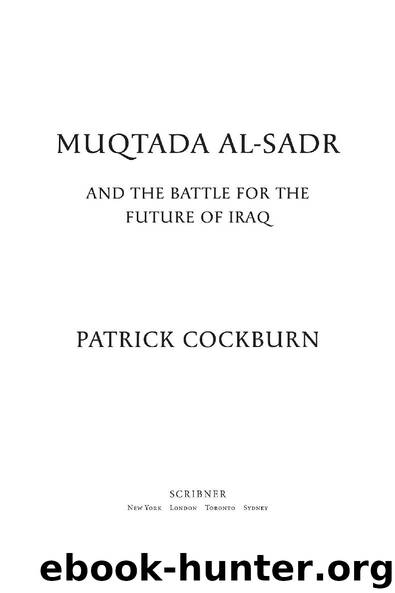Muqtada Al-Sadr and the Battle for the Future of Iraq by Patrick Cockburn

Author:Patrick Cockburn
Language: eng
Format: epub
Publisher: Scribner
CHAPTER TEN
Murder in the Shrine
The enemies of Saddam Hussein always attributed the extreme violence in Iraq to him and his regime. They optimistically imagined that once he was overthrown, Iraqis would be able to resolve their differences peacefully. But within twenty-four hours of Saddam’s fall on April 9, 2003, one of his ablest and most important opponents, Sayyid Majid al-Khoei, the son of Grand Ayatollah al-Khoei, was hacked to death by fellow Shia after being dragged, hands bound, from the Imam Ali shrine in Najaf. It was further alleged that he had not been accidentally killed by an out-of-control mob but was instead deliberately murdered on the instructions of Muqtada al-Sadr as part of a long-running family feud. The death of al-Khoei, a charming and intelligent man, was an early sign that the new Iraq was going to be just as dangerous as the old, possibly even more so. The Shia leaders wanted to use the overthrow of Saddam by the United States to displace the Sunni as rulers of Iraq, but the savagery of the attack in Najaf revealed the bitter divisions within their own community.
I last saw Sayyid Majid four months before he died, at a rancorous conference of the Iraqi opposition in London in mid-December 2002. As Londoners held pre-Christmas office parties in the Metropole Hotel on a rain-swept Edgware Road, they could not have guessed that they were rubbing shoulders with Iraqis engaged in the first battles to decide who would succeed Saddam. I saw Sayyid Majid—an alert, good-looking forty-three-year-old in a black turban, short dark beard, and flowing robes—sweep through the hotel lobby, attracting curious glances from partygoers sipping their margaritas. He had a slightly amused smile on his face, his normal expression, which suggested that he was not going to be surprised by anything that happened at the conference. I had first met him a decade or so earlier. On fleeing Iraq in 1991, after trying and failing to get American support for the Shia uprising, he had come to London. When his brother Mohammed Taqi was murdered in 1994, he became head of the al-Khoei Foundation, an influential and well-funded Shia charity with its headquarters in north London. He gathered a group of very able Iraqis around him and cultivated good relations with the British Foreign Office and the U.S. State Department. I saw him often. He would say that the Shia had made a mistake in 1920 by rising against the British occupation, enabling the Sunni to take power in their stead. This became something of a cliché later, but I first heard it from Sayyid Majid, and it represented an important political truth. The Shia community, a majority of Iraqis, was not going to oppose a U.S. attack on Iraq to overthrow Saddam. Sayyid Majid was also openly scathing about clerical supremacy in Tehran, though distressed when his criticisms of the Iranian regime appeared in print.
That December conference in London was all too accurate a guide to the chronic disunity of Saddam’s opponents in the years to come.
Download
This site does not store any files on its server. We only index and link to content provided by other sites. Please contact the content providers to delete copyright contents if any and email us, we'll remove relevant links or contents immediately.
| Afghan & Iraq Wars | American Civil War |
| American Revolution | Vietnam War |
| World War I | World War II |
Waking Up in Heaven: A True Story of Brokenness, Heaven, and Life Again by McVea Crystal & Tresniowski Alex(37003)
Empire of the Sikhs by Patwant Singh(22172)
We're Going to Need More Wine by Gabrielle Union(18072)
Hans Sturm: A Soldier's Odyssey on the Eastern Front by Gordon Williamson(16621)
Leonardo da Vinci by Walter Isaacson(11902)
The Radium Girls by Kate Moore(10907)
Educated by Tara Westover(7061)
Tools of Titans by Timothy Ferriss(6946)
How to Be a Bawse: A Guide to Conquering Life by Lilly Singh(6693)
The Last Black Unicorn by Tiffany Haddish(5075)
Permanent Record by Edward Snowden(4997)
The Rise and Fall of Senator Joe McCarthy by James Cross Giblin(4843)
Promise Me, Dad by Joe Biden(4447)
The Wind in My Hair by Masih Alinejad(4424)
The Crown by Robert Lacey(4105)
A Higher Loyalty: Truth, Lies, and Leadership by James Comey(4032)
The Iron Duke by The Iron Duke(3639)
Joan of Arc by Mary Gordon(3258)
How to be Champion: My Autobiography by Sarah Millican(3186)
